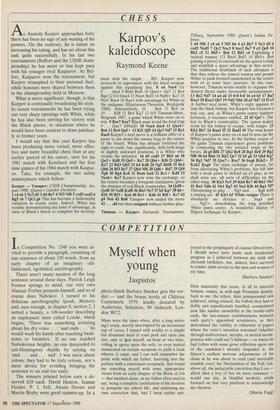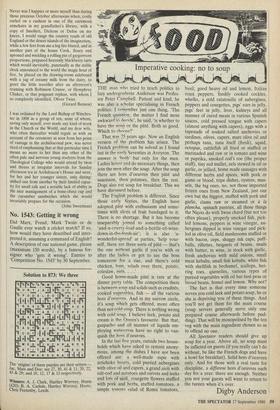COMPETITION
Myself when young
Jaspistos
In Competition No. 1540 you were in- vited to provide a paragraph, consisting of one sentence of about 150 words, from an early chapter of an imaginary old- fashioned, egotistical autobiography.
There aren't many masters of the long sentence around these days. Patrick Leigh Fermor springs to mind, our very own Alastair Forbes presents himself, and so of course does Nabokov. I turned to his delicious autobiography Speak, Memory and, sure enough, in chapter 8, section 2, I netted a beauty, a 149-worder describing an unpleasant tutor called Lenski, which begins, 'There was something irritating about his dry voice . . .' and ends . . .' he would wash his hands after touching bank- notes or banisters.' If no one reached Nabokovian heights, no one descended to sub-Hemingway depths by relying on 'and . . . and . . . and'. I was stern about colons: they had to be truly colonic, not a mere device for avoiding bringing the sentence to an end too early.
The winners printed below earn a de- served £18 each. David Heaton, Jeanne Fielder, P. I. Fell, Alcuin Davies and Martin Braby were good runners-up. In a photo-finish Barbara Smoker gets the ver- dict — and the bonus bottle of Château Cantemerle 1979, kindly donated by Asshetons, Solicitors, 99 Aldwych, Lon- don WC2.
Many were the times when, after a long morn- ing's study, merely interrupted by an occasional cup of cocoa, I turned with avidity to a simple but abundant meal of roast pork and open jam tart, only to 4nd myself, an hour or two later, rolling in agony upon the sofa, or even indeed summoned on certain occasions to yield it back whence it came; and I can well remember the pride with which my father, hurrying into the parlour with a convenient receptacle, first found me consoling myself with some appropriate verses from an early chapter of the Book of Job — that incident alone, as my father often used to say, being a complete justification of his decision to postpone my school life, and endorsing my own conviction that, had I been earlier sub- jected to the propinquity of coarser-fibred boys, I should never have made such intellectual progress as I achieved between my sixth and eleventh birthdays, nor, indeed, have survived to render adult service to the men and women of my time.
(Barbara Smoker) How insistently that scene, in all its intricate tension, comes, in well-nigh Proustian density, back to me: the tellers, their quinquennial task achieved, sitting relaxed, the ballots they had so deftly and expeditiously bundled, accumulated now like sinister snowdrifts at the trestle-table ends; the last-minute confabulations between each party's appointed scrutineers, as they determined the validity or otherwise of papers where the voter's intention remained (whether through inadvertence, myopia, or mental incom- petence who could say?) dubious — or where he had (often with some gross reflection upon one of the candidate's morals) despoiled it; the Mayor's endless nervous adjustments of his chain as he was about to read (and inevitably stumble over) the Declaration of the Poll; but, above all, the ineluctable conviction that I too— albeit then a boy of but six mere summers would one day, in blushful modesty, stride forward on that very platform to acknowledge my election. (Martin Fagg)
Never was I happier or more myself than during those precious October afternoons when, cosily curled on a cushion in one of the enormous armchairs in my grandfather's library, with a copy of Smollett, Dickens or Defoe on my knees, I would range the country roads of old England or the desert islands of the imagination, while a few feet from me a log fire blazed, and in another part of the house Cook, floury and aproned and wielding a rolling pin of gargantuan proportions, prepared heavenly blackberry tarts which would inevitably, punctually as the stable clock announced to the world the magic hour of five, be placed on the drawing-room sideboard with a jug of creamy milk from the dairy, to greet the little traveller after an afternoon's roaming with Robinson Crusoe, or Humphrey Clinker, or that poignant orphan, with whom I so completely identified, Oliver Twist.
(Gerard Benson)
I was ordained by the Lord Bishop of Winches- ter in 1898 in a group of ten, none of whom, saving only myself, ever made any kind of mark in the Church or the World, and my dear wife, who often thereafter would regale us with an account of the ceremony as seen from her point of vantage in the archidiaconal pew, was never tired of emphasising that at that particular time I meant no more to her than any other of the often pale and nervous young students from the Theological College who would attend by twos and threes at irregular intervals for Sunday afternoon tea in Archdeacon's House and were, for her and her younger sisters, only disting- uished one from another by their limited capac- ity for small talk and a notable lack of ability in the nice management of a bone-china cup and the cucumber sandwiches which she would invariably prepare for the occasion.
(John Sweetman)



































































 Previous page
Previous page